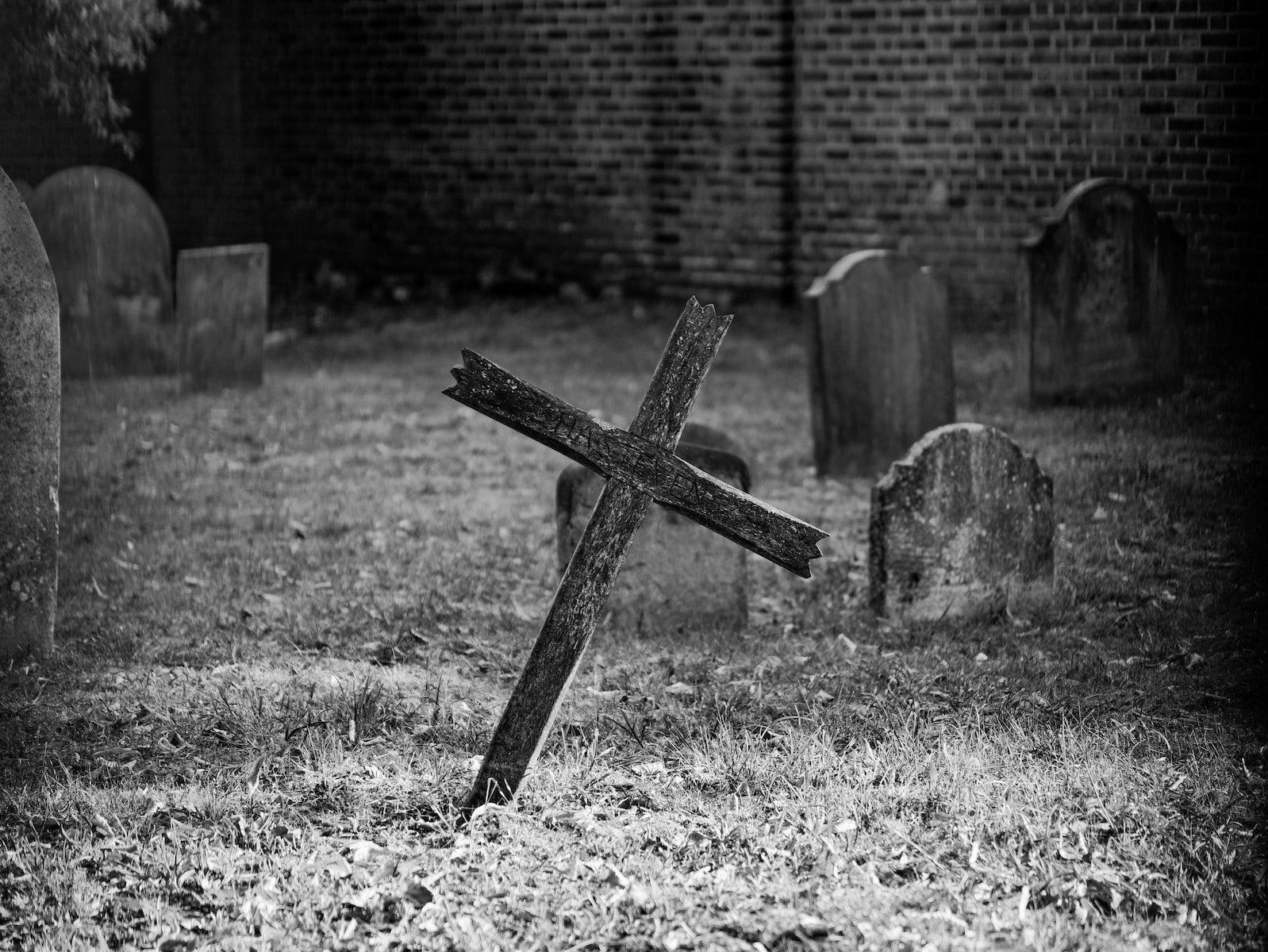Death is scary. I do not know a single honest person who would say otherwise. Yes, that shrieking reality can be met with great faith and courage. Regardless, that does not change the fact that it is a horrifying thing to consider. The problem is not that we do not believe in Heaven. It is the fact that it takes faith to get us there. We cannot see beyond the shadowy veil until we are wrapped in its dark embrace. No matter our faith background, death is a dark, creeping mystery that awaits us all.
If we are honest with ourselves and accept this truth, then we can make progress towards dealing with death. Accepting that life ends in death helps us to deal with its frightful certainty. Only then can we know how to live our lives in the face of death.
Accepting the Facts
Too often, I hear people claim that they are not scared of death. I used to believe this was great faith, however, I am not so convinced these days. Certainly, there will be some people who have amazing faith. They can settle their fate head-on. In general, though, most people have (at least) a lick of fear in the face of death.
John Bunyan addresses this fear in The Pilgrim’s Progress. At the point where Christian and Hopeful are ready to cross the river of death into the Celestial Kingdom, we see two responses to death. Hopeful seems to cross easily, without much trouble. Christian, on the other hand, begins to despair. He feels like the waters are overcoming him and that he is about to drown. Thankfully, he arrives at the other side and is able to enter into the Celestial Kingdom. This shows us that Christians, at least since Bunyan’s time, have struggled with the creeping shadow of approaching death. That must have been the case if Bunyan felt the need to write about it in his book.
Knowing that we are not the first generation to struggle gives us hope. We do not need to hide what our forefathers have held in honesty. We do not like to admit that we are scared, because that sounds like we are unfaithful. So, instead of confronting our faithlessness, we hide and lie to ourselves about it. This is very unhealthy for our spirituality. If we hide our sins from each other, then how can we counsel each other (Gal 6:2)? No, we must learn to share our fears, concerns, and sins with one another so we can help each other grow in faith and overcome those issues.
The reality is as Martin Luther once wrote:
Death looms so large and is terrifying because our foolish and faint hearted nature has etched its image too vividly within itself and constantly fixes its gaze on it. Moreover, the devil presses man to look closely at the gruesome mien and image of death to add to his worry, timidity, and despair. Indeed, he conjures up before men’s eyes all the kinds of sudden and terrible death ever seen, heard, or read by man. And then he also slyly suggests the wrath of God with which he [the devil] in days past now and then tormented and destroyed sinners. In that way he fills our foolish human nature with the dread of death while cultivating a love and concern for life, so that burdened with such thoughts man forgets God, flees and abhors death, and thus, in the end, is and remains disobedient to God.1Luther. Martin, A Sermon on Preparing to Die in Luther’s Works. 42.55. Tr. Bertram. M. T. Fortress Press. Philadelphia: PA. (1969), 101.
We see that there is a great fight in our hearts to accept the fear we have over death. We are all prone to this and we must learn to admit it.
Do you struggle with the fear of death? Dear believer, please do not hide that from those around you. Hiding it will only aggravate its hold on your life. You will give it a foothold into your soul, which will constantly rattle your faith. Please be courageous enough to talk with those whom you trust. Seek comfort and counsel from friends and pastoral leaders. They may just help you to face death by grace. Doing this, you will then have the way opened to know how to live your life in the face of death.

How to Live in Face of Death
The Apostle Paul once wrote: “We have this as a sure and steadfast anchor of the soul, a hope that enters into the inner place behind the curtain” (Heb 6:19). He is, of course, talking about eternal life in the hope of Christ’s sacrifice. Our hope in Him is like a steadfast anchor on the raging waves of the sea of life. Beyond the curtain of death, we know He awaits us with open arms to wipe away the tears of this life. As our boats begin to capsize into death, we have only one choice if we are to avoid being overwhelmed. Hold fast to the anchor. He is the only way to deal with the deluge of spiritual and physical difficulties that come upon us in face of death.
Clinging to Him is the only thing that will give us strength to face that day. What about today? If we are not on the point of death right now, how is this relevant to us?
Knowing that no matter what we do in this life everything ends in death is a sobering reality. Sobering enough to help us realize that none of our possessions or achievements will come with us to Heaven. Our money, trophies, and goods will be left behind as our souls depart our bodies in death. What remains? Paul tells us that there is a kind of gold that goes to Heaven: “Now if anyone builds on the foundation with gold, silver, precious stones, wood, hay, straw—each one’s work will become manifest, for the Day will disclose it, because it will be revealed by fire, and the fire will test what sort of work each one has done” (1 Cor 3:12–13).
Jesus Christ Himself is the foundation (v. 11). This means that, no matter what, if your foundation is Christ, then you are saved. The end of your life will come and you will be accepted into the Kingdom of God. Once you have come to this covenantal standing with God, what is left for your life? Paul has told us: what remains is what we build on the foundation.
Too many people today are highly focused on gaining wealth and possessions for their comfort. They invest as much money as possible in buying a house, an expensive car, and other luxuries. It is not wrong to provide for our families like this, but take a moment to think about something. None of that will remain in eternity. Our hard work for things in this life will not amount to anything in eternity. What will remain is what we build on the foundation of Christ. If we put all our gold into earthly possessions and give nothing but straw to Christ, then that will show in eternity. If, however, we give our money to Kingdom work, use our time for Kingdom ministry, and work hard to live holy lives, then that is what will remain in eternity.
The idea is that we might reward our hard work and financial ventures in this life with more stuff. Doing so, however, means that our reward in eternity will shine that little bit less brightly. Not that we will be unsatisfied when we get there. What it does mean though is that if we are not invested in eternity in this life, then that will impact our eternal reward. Surely it is better to focus on what we can gain in Heaven, rather than what we can gain in this life?
Thinking about this should motivate us to live properly in this life. We have a finite amount of time and nothing we amass here remains for eternity. That is why we should be willing to give our best to God, even if we have to sacrifice comforts in this life. Death is coming. What more can we do to be prepared than by clinging to Christ? How can we better cling to Christ than by giving our all to Him in this life?
I think Richard Baxter really nailed the point about our comforts in his Dying Thoughts:
Were it not for bodily interest and its temptations, how much more innocent and holy might I live! I should have nothing to care for, but to please God and be pleased in him, were it not for the care of this bodily life. What employment should my will and love have but to delight in God and love him and his interest, were it not for the love of the body, and its concerns? By this our mind is darkened, our thoughts diverted, our wills corrupted, our heart and time alienated from God, our guilt increased, our heavenly desires and hopes destroyed; life is made unholy and uncomfortable and death terrible; God and souls separated, and eternal life is neglected and in danger of being utterly lost.2Baxter. R. Dying Thoughts. The Banner of Truth Trust. Edinburgh: Scotland. (2016), 43–44.
Baxter is certainly correct. We are reluctant to embrace death (and thus Christ), because we have too much pleasure in this life. We maybe even believe that the pleasures of this life are better than that which is to come. What a despicable lie we tell ourselves.
Let us learn to reflect as we traverse this life. Do I really need these things? Do I really need to spend my time on this thing? Is this representative of a holy life? Our time is limited. We must face that fact head on and live accordingly. The only way is to focus on Jesus Christ and live as He would have us live (Heb 12:2).
Have you accepted that death is coming for you? It might be tomorrow. It might be fifty years from now. Rest assured, however, it will come for you one day. Are you scared? Whom can you talk to about your fears? Are you utilizing this life as best as possible to build gold in Heaven? What more can you do to build into that glorious eternity?
Whomever we are, we will always have some fear of death. We can deal with this by regularly talking about our struggle with trusted believers. We can also all do better to live in the knowledge that this life is temporary. Is there anything you can give up so as to build better gold in eternity? Maybe you can give up some time to be used by your church? Or maybe you can give your money so that God’s work can be accomplished. We can all improve here, so it is worth the self-examination.
Looking for ways to improve and acting on them will help us a lot. Death will seem less like an enemy and only the gateway to our pleasant eternity. Our faith will increase and we will be better geared to serve the Lord as our doubts are defogged and our hearts more in line with how He would have us live.
References




